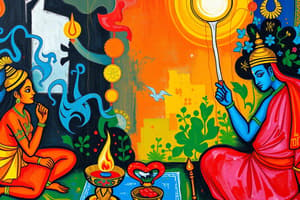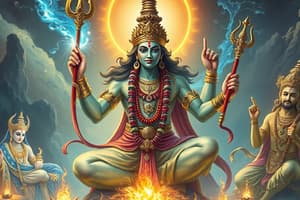Podcast
Questions and Answers
Hinduism views the divine as exclusively male or female.
Hinduism views the divine as exclusively male or female.
False (B)
Divali is celebrated for a duration of roughly three to four days.
Divali is celebrated for a duration of roughly three to four days.
False (B)
Holi is primarily celebrated in honor of the goddess Sarasvati.
Holi is primarily celebrated in honor of the goddess Sarasvati.
False (B)
Hinduism has a single historical founder comparable to major religious figures like Jesus or Muhammad.
Hinduism has a single historical founder comparable to major religious figures like Jesus or Muhammad.
Puja is the primary form of worship that Hindus perform at home.
Puja is the primary form of worship that Hindus perform at home.
The earliest sacred texts of Hinduism, the Vedas, are believed to date back to at least 3000 BCE.
The earliest sacred texts of Hinduism, the Vedas, are believed to date back to at least 3000 BCE.
Prasad refers to the offerings made to the deities during worship.
Prasad refers to the offerings made to the deities during worship.
The Upanishads were primarily written between 800 and 400 CE.
The Upanishads were primarily written between 800 and 400 CE.
Hindu worship is typically conducted at a designated time and place in a community setting.
Hindu worship is typically conducted at a designated time and place in a community setting.
There is one text in Hinduism that serves as the ultimate authority similar to the Bible for Christians.
There is one text in Hinduism that serves as the ultimate authority similar to the Bible for Christians.
Temple worship rituals are generally simpler than home puja rituals.
Temple worship rituals are generally simpler than home puja rituals.
Karma and reincarnation are central beliefs within Hinduism.
Karma and reincarnation are central beliefs within Hinduism.
The Mahabharata is recognized as the longest epic poem but is less known than the Ramayana.
The Mahabharata is recognized as the longest epic poem but is less known than the Ramayana.
Hinduism promotes the idea that all revealed religions are essentially correct.
Hinduism promotes the idea that all revealed religions are essentially correct.
The Vedas and Upanishads were both written in the first millennium CE.
The Vedas and Upanishads were both written in the first millennium CE.
Hinduism lacks a designated religious hierarchy responsible for official doctrine or practice.
Hinduism lacks a designated religious hierarchy responsible for official doctrine or practice.
The Vedas are considered the most authoritative texts in Hinduism, believed to have been written as late as 1200 BCE.
The Vedas are considered the most authoritative texts in Hinduism, believed to have been written as late as 1200 BCE.
The Upanishads were primarily composed after the Mahabharata and Ramayana.
The Upanishads were primarily composed after the Mahabharata and Ramayana.
Hinduism recognizes the cyclical nature of time as a foundational belief.
Hinduism recognizes the cyclical nature of time as a foundational belief.
All Hindus unanimously believe in the same practices and doctrines without any variation.
All Hindus unanimously believe in the same practices and doctrines without any variation.
Hinduism perceives the divine as neither solely one nor solely many, but instead both.
Hinduism perceives the divine as neither solely one nor solely many, but instead both.
Divali celebrates the goddess Ganesha and lasts approximately six to seven days.
Divali celebrates the goddess Ganesha and lasts approximately six to seven days.
Puja performed at home involves engaging all five senses to please the gods.
Puja performed at home involves engaging all five senses to please the gods.
During temple worship, priests perform puja to idols imbued with divine presence at all times.
During temple worship, priests perform puja to idols imbued with divine presence at all times.
Holi is primarily celebrated to mark the beginning of autumn and involves quiet reflection.
Holi is primarily celebrated to mark the beginning of autumn and involves quiet reflection.
Study Notes
Hinduism Overview
- No historical founder; lacks a single authority comparable to major world religions.
- Origin is ambiguous with no fixed date; earliest sacred texts, the Vedas, date back to at least 3000 BCE, possibly as early as 8000-6000 BCE.
- Vedas considered by many as divine and timeless.
Core Beliefs of Hinduism
- Divinity of the Vedas
- Existence of one all-pervasive Supreme Reality
- Cyclical concept of time
- Law of karma (action and consequence)
- Reincarnation belief
- Presence of alternate realities and higher beings
- Role of enlightened masters or gurus
- Emphasis on non-aggression and non-injury
- Recognition of validity in all revealed religions
- Spiritual identity as primary nature of living beings
- Support for an organic social system.
Sacred Texts
- Hinduism lacks a singular authoritative text; instead, there are multiple collections.
- Vedas: Oldest texts with the most authority, likely written between 1800-1200 BCE.
- Upanishads: Philosophical works created between 800-400 BCE, contemporary with early Buddhist teachings.
- Mahabharata: The world's longest epic poem, best known for the Bhagavad-Gita.
- Ramayana: Another significant epic in Hindu literature.
Understanding Deities
- Hinduism embraces a complex view of the divine, integrating monotheism and polytheism.
- Key deities include Vishnu, Shiva, Ganesha, Krishna, Sarasvati, Durga, and Kali.
- Numerous festivals celebrate various gods and seasonal events, with two prominent festivals being Divali and Holi.
Major Festivals
- Divali: Festival of lights, celebrated in October or November for about 4-5 days, honoring Lakshmi, the goddess of wealth. Families engage in rituals at home and temples, filling spaces with light.
- Holi: Spring festival known for vibrant throwing of colored powders, celebrated with enthusiasm over several days.
Worship Practices
- No standard weekly worship service; worship can occur privately at home shrines.
- Puja: Central act of worship, involving respect, homage, and rituals to deities, both at home and in temples.
- Home altars feature representations of deities; daily offerings are common.
- Temple rituals are more elaborate, conducted by priests with the return of offerings as prasad (blessings) to devotees.
- Worship engages all five senses to honor the divine presence.
Origin of Hinduism
- No historical founder; lacks a single comparable figure like Jesus or Muhammad.
- No firm date of origin; earliest texts, the Vedas, date back to at least 3000 BCE, with some estimates as early as 8000-6000 BCE.
- Vedas are viewed by some Hindus as divine and timeless.
- No central authority or hierarchy governing Hindu doctrine or practice; diversity in beliefs and practices is common.
Core Principles of Hinduism
- Belief in the divinity of the Vedas and one all-pervasive Supreme Reality.
- Understanding of time as cyclical, with concepts of karma and reincarnation.
- Recognition of alternate realities populated by higher beings.
- Respect for enlightened masters or gurus; emphasis on non-aggression and non-injury.
- Acceptance that all revealed religions hold truth and that spiritual essence precedes material existence.
- Emphasis on an “organic social system” reflecting holistic community interaction.
Sacred Texts of Hinduism
- No single authoritative text; various collections exist instead.
- Vedas are the oldest, with significant authority, believed composed around 1800-1200 BCE.
- Upanishads focus on philosophical teachings, created between 800-400 BCE.
- Mahabharata is the longest epic poem, including the Bhagavad-Gita, a key text in Hindu teachings.
- Ramayana is another major epic, central to Hindu storytelling.
Deities in Hinduism
- Hinduism's divine understanding accommodates both unity and multiplicity.
- Important deities include Vishnu, Shiva, Ganesha, Krishna, Sarasvati, Durga, and Kali.
- Numerous festivals celebrate varied deities, their stories, and seasonal or life events.
- Notable festivals:
- Divali: Festival of lights, honoring Lakshmi; lasts 4-5 days, involves home and temple worship.
- Holi: Spring festival marked by throwing colored powders, enjoyed with exuberance.
Hindu Worship Practices
- No set communal worship times; personal and flexible worship favored.
- Home shrines are common for individual worship; puja (respect or homage) is central to practice.
- Daily puja rituals may include prayers, lighting lamps, offering flowers/fruit, and ringing bells to appease deities.
- Temple worship involves elaborate rituals led by priests; offerings made are returned as prasad (blessings).
- Devotees engage their senses to connect with the divine during worship, emphasizing the sharing of offerings.
Studying That Suits You
Use AI to generate personalized quizzes and flashcards to suit your learning preferences.
Description
This quiz explores the fundamental aspects of Hinduism, including its core beliefs, sacred texts, and historical context. Participants will learn about the divine nature of the Vedas, the concept of karma, and the cyclical understanding of time within this ancient religion. Test your knowledge of Hinduism's unique teachings and philosophies.




